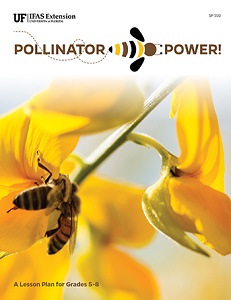Middle school science teachers have a new tool from the University of Florida to teach students about pollinators and the role they play in producing food.
Nicole Pinson and Alicia Lamborn, horticulture agents with the UF Institute of Food and Agricultural Sciences Extension in Hillsborough and Baker counties, respectively, helped develop the new curriculum, called “Pollinator Power.”
“Teaching youth about pollinators is important so they may develop an understanding of and appreciation for the link between pollinators and the food we eat,” Pinson said. “Some of our favorite foods — such as watermelon and blueberries — come from pollinated plants. Without pollinators, the food we eat would be limited.”
The curriculum contains three lesson plans and a variety of activities to introduce students to pollinators in fun, interactive ways.
“The thinking behind the activities is to engage students in several ways: inside the classroom through computer-based, online learning; outside the classroom in natural areas; and through relevant, real-world inquiry,” Pinson explained.
The curriculum includes a Pollinator Power Safari Kit, which contains bug jars, a butterfly net, magnifier, and insect and flower rubbing plates. With these supplies, students can scout a garden or landscape for pollinator insects and animals. In another activity, students get to “Be the Bee” by hand-pollinating squash or zucchini flowers.
For teachers, the curriculum is a one-stop shop for teaching pollinator science, Pinson said.
“With content and resources already compiled for teachers and students, it saves teachers time researching and planning the lesson,” she said. “Educators will appreciate the curriculum’s easy-to-follow layout, which includes learning objectives, timeframes for activities, references and online resources, and optional items to supplement teaching that are available for purchase or online.”
While the lessons were designed to mirror topics taught in grades five through eight, teachers can adapt them for learners of other ages and even adults, Lamborn said.
With reports of declining pollinator populations, this curriculum is highly relevant to students today who want to know how to support pollinators, she added.
“For instance, one learning activity has the class construct a ‘bee hotel’ and set it up in a pollinator friendly part of the school,” said Lamborn. “This activity teaches students about solitary bees and wasps that nest in the kind of hollow spaces included in the hotel.”
For educators with students who are afraid of bees and wasps, the curriculum can help those students better appreciate these insects and to see them as beneficial, Lamborn said..
In Pinson’s experience, however, most youth enjoy learning about pollinator insects and animals, especially when they are able to identify them in the garden or schoolyard.
To order the Pollinator Power curriculum, visit the UF/IFAS Extension bookstore website (ifasbooks.com).
-30-
The mission of the University of Florida Institute of Food and Agricultural Sciences is to develop knowledge relevant to agricultural, human and natural resources and to make that knowledge available to sustain and enhance the quality of human life. With more than a dozen research facilities, 67 county Extension offices, and award-winning students and faculty in the UF College of Agricultural and Life Sciences, UF/IFAS works to bring science-based solutions to the state’s agricultural and natural resources industries, and all Florida residents. Visit the UF/IFAS web site at ifas.ufl.edu and follow us on social media at @UF_IFAS.
 0
0
